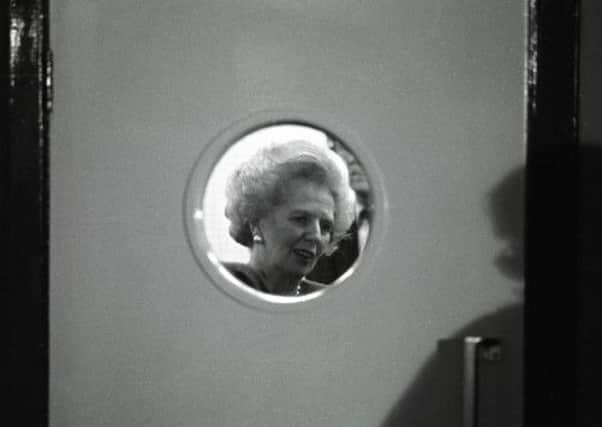David Spencer: Yes, the Tories should salute Thatcher, but they must show they have moved on


As we have seen from the extensive commentary on her political legacy, and numerous voxpops from both sides of the political divide, Thatcher is still a deeply divisive figure more than twenty years after she left office.
While the Right mourn the loss of the woman who implemented their small-state, low tax beliefs and dragged Britain from its “Sick Man of Europe” status after the Winter of Discontent back to being a global economic power, the Left see the passing of a tyrant who destroyed the coal industry and British manufacturing, whilst creating mass unemployment and social inequality.
Advertisement
Hide AdAdvertisement
Hide AdThe next couple of weeks will see much picking over of Thatcherism and the legacy she left behind in the media. It will return the political debate back to the entrenched, polarised positions of the 1980s. And this couldn’t happen at a worse time for the Tories.
The Conservative Party has taken 13 years to make itself electable again. There has been much infighting, and the party has been dragged to the right and to the centre in search of a political platform which appealed to a majority of the public.
Arguably it is only since David Cameron’s modernisation strategy from 2005, that the party has finally emerged from the shadow of her leadership, detoxified the Conservative brand in the eyes of many, and developed a new, modern identity and policy position.
But on finally returning to power, albeit as part of a coalition, the Tories have found themselves bound by the toughest financial circumstances faced by any administration since Thatcher’s government came to power in 1979.
Advertisement
Hide AdAdvertisement
Hide AdA combination of financial necessity and intuitive reformist zeal has seen the coalition embark on an ambitious and yet controversial legislative programme. Labour’s opposition to almost every policy has been steadfast, but their lack of coherent alternatives has seen them return to the strong left-wing rhetoric of the Thatcher years.
Meanwhile the Government’s failures to adequately sell the merits of their policies to the general public has led to political landscape moving back towards the ideological divisions last seen in the 1980s.
The Government has made sweeping reforms to the education system, which has been vociferously resisted by the teaching unions.
Changes to the structure of policing have been roundly condemned by the Police Federation.
Advertisement
Hide AdAdvertisement
Hide AdCuts to arts funding have provoked high-profile criticism from actors and musicians. And many Labour-run Local Authorities have been quick to blame cuts to their frontline services on central funding restrictions.
In the last couple of weeks, welfare reform has been most in the spotlight. Polling suggests that most people agree that the welfare system needs urgent reform, but poor media management and highly politicised opposition has seen the debate descend into ideological mudslinging, with accusations and counter-accusations about who has betrayed the neediest in society more.
With the next General Election edging closer, the Conservative Party cannot afford to allow this polarisation to continue. Their election hopes are pinned on appealing to the middle classes and “white van Conservative” working class swing voters. Precisely those people who were driven away from the Conservative’s in the 1990’s because they felt the party Margaret Thatcher created no longer spoke for them.
The modernisation of the party had mitigated this perception, and a return to Thatcherism rhetoric runs the real risk of re-toxifying the Conservative brand at what is a critical juncture for them.
Advertisement
Hide AdAdvertisement
Hide AdThe Thatcher retrospective which we will see in the next couple of weeks will only serve to re-entrench the polarised political divide we have seen in since 2010. It plays perfectly into the Left-wing strategy of divide and rule.
In the 1983 election, the Conservative Party’s hopes were aided by the Falklands War boost and the charisma and personality of a natural leader at the helm. Today sees the country fighting a hugely unpopular, ongoing campaign in Afghanistan and the Tories with a far less dynamic and unifying leader.
Of course, the Conservative Party, and the country, must pay tribute to one of their greatest post-war leader. But it is vital that they don’t get sucked back into debates of the past.
The Tories need to continue to be portrayed as a modernising force. And they need to be judged on the policies of today, not of those from a quarter of a century ago.